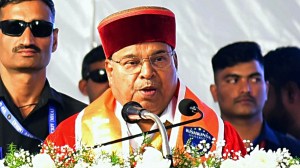The future in dispute
The ugly consequences of imposing an aluminium plant upon an unwilling people...THE tragic death of three tribals in police firing in Maik...

The ugly consequences of imposing an aluminium plant upon an unwilling people8230;
THE tragic death of three tribals in police firing in Maikanj village in Kashipur block of Rayagada district, Orissa, on December 16 can only be attributed to provocation by politicians. Maikanj village is widely known as the centre of the five-year-old agitation against the bauxite mine and processing plant being sought to be established by Utkal Alumina Ltd, an Indian-Norwegian consortium. By attempting to hold a meeting in this village to support the project, the all-party initiative led by Biju Janata Dal BJD leaders, who belong to the ruling party in Orissa, was bound to trigger off a clash, as the local administration had reportedly warned.
During these five years, the movement against the Rs 4,500 crore project has prevented officials from surveying the land and carrying out other preparatory work. On one occasion, three Norwegian officials from Norsk Hydro Aluminium, which is a major partner in the venture, were apprehended by the villagers and forced to sign a statement against their company. Since the company has been prevented from proceeding with its activities, the morale of the villagers, who apprehend that their livelihood will be disrupted once the plant starts functioning, has been growing stronger. The politicians and several sections of the state administration and the police in the past have held NGOs in the area, particularly one called Agragamee, responsible for inciting the tribals.
The Agragamee campus in Kashipur has been isolated, with its electric and telephone connections severed. In the current vitiated atmosphere, activists in Orissa fear that its director, Achyut Das, may be manhandled by goons or arrested by the police. It is absurd to blame NGOs for the hard line taken by the tribals. A couple of years ago, Bhubaneshwar bureaucrats were able to get Agragamee and two other NGOs in the area debarred from receiving state funds. This blacklisted these agencies, although they had been doing exemplary work. Ironically, Agragamee had been praised by previous Orissa social welfare and other secretaries, as well as by the topmost officials in ministries in New Delhi. Achyut Das, who has worked in this chronically poor area for nearly two decades, was accused of having a vested interest in keeping people in penury so as to continue soliciting funds.
This is simply ridiculous. The fact is that the tribals of Kashipur are among the poorest of the poor not just in Orissa or in India but in the entire world. South Asia and sub-Saharan Africa are the two endemically poverty-stricken regions in the globe and there is no denying that Orissa harbours some of the most deprived pockets, especially in tribal districts. Under these trying circumstances, the reason why these villagers are opposed to the multi-crore plant is that they realise that even if some of those displaced will receive a well-paid job in the project, it will spell the end of the community8217;s subsistence farming. Baphlimali, the plateau where the bauxite ore is located, is the source of several springs which feed the streams in Kashipur. While the alumina plant may bring prosperity to a few, it will mean destruction of the natural resource base of the majority.
Orissa has witnessed several non-political spontaneous people8217;s movements against big industrial and other projects, including the Rs 20,000 Tata steel plant, the Gandarmardhan bauxite mine and Baliapal missile test firing range, all of which had to be abandoned. It is a tribute to these most marginalised of people that they have had the determination not to let short-term gain deprive them of their sustainable livelihood in the long term. Chief Minister Naveen Patnaik, who has gone on record as saying that Orissa8217;s priority was not industry but agriculture, ought to restrain politicians in Rayagada from imposing an alumina plant on an unwilling people.
Darryl D8217;Monte, a former resident editor of The Indian Express8217;, reported from Kashipur in October for Public Press
- 01
- 02
- 03
- 04
- 05































